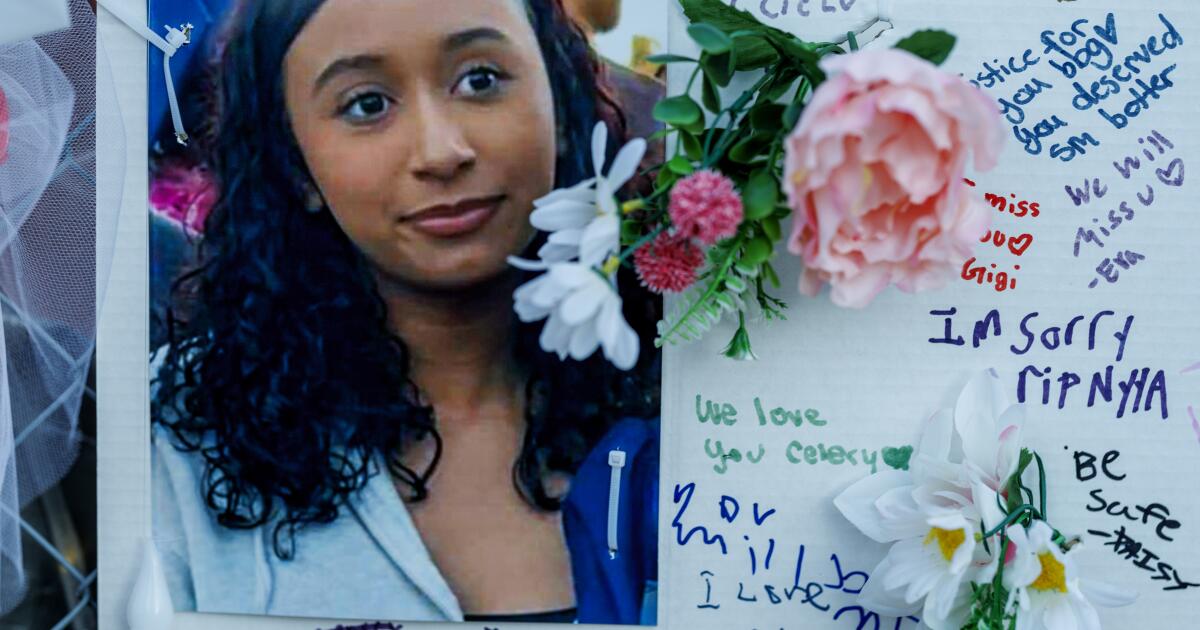D4vd ‘target’ of grand jury murder probe into teen found in his Tesla
D4vd is the “target” of a Los Angeles County criminal jury investigation into the death of a teenage girl. The singer’s star was on the rise, with a global tour in his future, before the discovery of the girl’s remains in the front trunk of his Tesla.
The singer, whose real name is David Burke, has been the subject of the probe since November, months after the dismembered body of 14-year-old Celeste Rivas Hernandez was found in the car after it was towed off a street in Hollywood.
According to a grand jury subpoena seeking to have Burke’s father, mother and brother testify in L.A., the musician is described as “Target David Burke,” who may have committed a criminal offense in California, “to wit: One count of Murder.”
The document was part of a legal challenge to the subpoenas filed by the singer’s family in Texas. The newly unsealed documents reveal that, when Los Angeles police opened up the Tesla trunk, they found “a black cadaver bag covered with insects and a strong odor of decay” inside. Investigators had been granted a search warrant to look in the vehicle Sept. 8 after a tow yard worker noticed a rotting smell emanating from the vehicle.
According to the document, detectives partially unzipped the bag and found “a decomposed head and torso.”
Criminalists and medical examiners then processed the body.
“Upon removing the cadaver bag from the front storage compartment, it was discovered the arms and legs had been severed from the body,” the subpoenas noted. “A second black bag was discovered underneath the cadaver bag. Upon opening the second bag, the dismembered body parts were discovered.”
Los Angeles County Deputy Dist. Atty. Beth Silverman issued the subpoenas on Jan. 15, with Superior Court judge Craig Richman approving them.
The First Court of Appeals in Texas on Feb. 9 denied petitions from the three Burke family members to ignore the subpoenas.
Months have passed since the gruesome discovery of the remains of Celeste Rivas Hernandez. Although the LAPD has publicly declined to characterize the girl’s death as a homicide, an LAPD detective referred to the case as a murder investigation in a court filing.
In November, prosecutors began presenting evidence to a grand jury, described at the time as an investigative grand jury, according to a source who spoke on the condition of anonymity because they were not authorized to discuss the case with the media.
Since then, numerous witnesses have been called in to testify, among those, one of the musician’s managers. A friend of D4vd, Neo Langston, was arrested in Montana after ignoring a subpoena and was recently forced to return to L.A. to testify.
In a Texas appeals court footnote, the court refers specifically to the singer’s true name. The court states that the “underlying case” is “The People of the State of California v. David Burke,” pending in the 506th District Court of Waller County, Texas, with Judge Gary W. Chaney presiding. There is no public case with that name, but grand jury proceedings are confidential.
The singer’s father, Dawud, mother, Colleen, and brother, Caleb, reside in Texas, according to court records. Lawyers for the trio could not be reached for comment.
Detectives have spent months investigating the circumstances surrounding the girl’s death, as well as her relationship with D4vd.
His Tesla sat abandoned on a street in the Hollywood Hills for several weeks — potentially months — before its removal.
Authorities uncovered Celeste’s body the day after her 15th birthday. Her family had previously reported her missing.
L.A. Police Capt. Scot Williams, who leads the Robbery-Homicide Division, said the girl had been “dead for at least several weeks.” Williams said the body had not been decapitated or frozen, as some news outlets have reported.
Detectives determined that the Tesla had been parked on Bluebird Avenue since late July — around the time D4vd began a national tour. The tour was canceled soon after the death investigation drew worldwide media attention.
